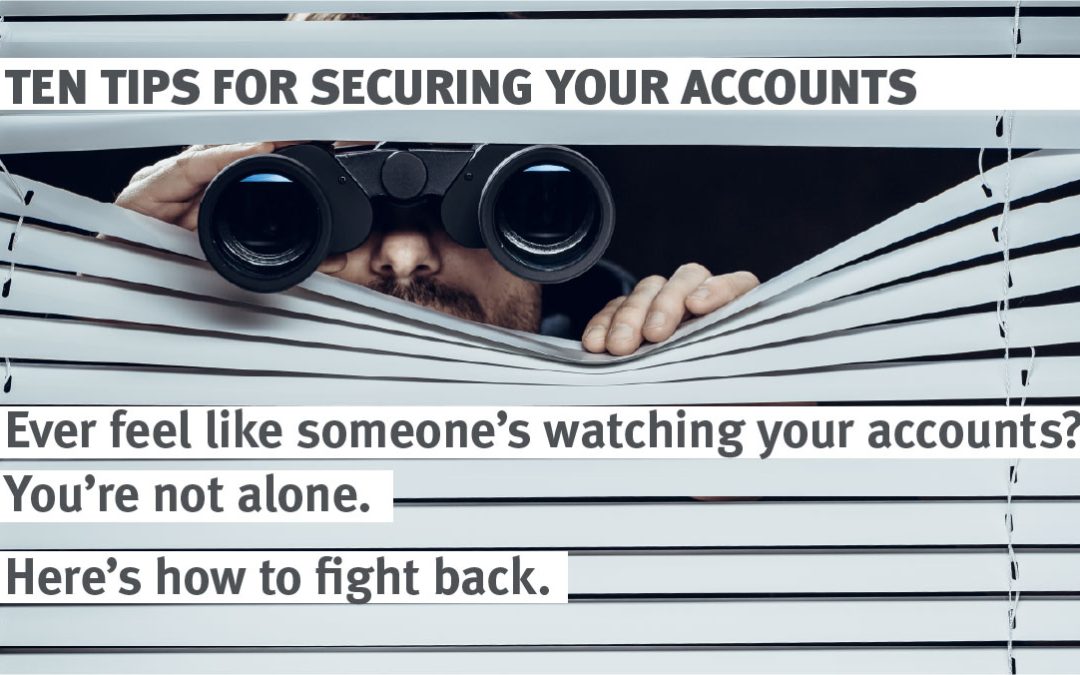The Bottom Line
Small business is important to Central Oregon, and to Mid Oregon. Find tips and resources for business, and information about Mid Oregon’s commercial services and business members.

Think you are too smart to be scammed?
Think you are too smart to be scammed? You may be right, but in these fraud-frenzy times, whether it’s you or a friend or family member—anyone can fall for a scam.
Emails
That “urgent” emails and texts about your account? Emails saying your account’s locked can be scary. But before you click that link, take a deep breath. Financial institutions will never contact you out of the blue like that with such urgency.
Your move: Instead of clicking, call them directly or visit their official website or app to check your account. If there’s a real issue, you’ll see it there.
You’ve Won a Prize!
“You’ve Won!” …but you have to send money to get it. Those messages saying you’ve won a prize but need to pay a “small fee” to claim it? Total scam.
Your move: Just delete it and block the sender. Real prize winnings don’t make you pay upfront.
Random Calls
Suspicious calls asking for your info? Someone calling claiming to be from us (or any financial institution) and asking for your account numbers, passwords, or PIN? Big red flag!
Your move: Just politely hang up. Then, call us directly using the number on your card or our official website. We’ll be able to tell you if we actually contacted you.
Social Media
Weird Link in an email, text or social media? Our fingers and thumbs are quick, but take a second before tapping on links from unknown numbers or sketchy-looking social media posts. They can lead to fake websites designed to steal your info.
Your move: If you’re unsure, don’t click. Go directly to the official website of the company or organization mentioned.
Urgent Requests
Feeling Pressured to Act Fast? Scammers love to create a sense of urgency so you don’t have time to think. If someone’s pushing you to make a decision or send money right now or face bad consequences, that’s a major warning sign.
Your move: Take a step back and don’t fall for the scam. Legitimate requests will give you time to consider.
Education is your best defense against fraud. To learn more about protecting your personal information and finances, visit Mid Oregon’s Security and Fraud Page.

Don’t Let the Summer Heat Up Your Budget
Summer can be packed full of fun things that distract you from your financial goals. In the midst of all that fun, it can be easy to lose sight of you budget.
The temptation to spend a little extra here, or there, is common—but that temptation can lead to overspending.
Here are a few tips to help you make the most of your summer, while being kind to your budget.
Try a Staycation
This summer, trade in you costly vacation for an exciting adventure close to home. Rediscover the wonders of Central Oregon and unleash that inner tourist while visiting this vibrant area where we work, live, and play.
Central Oregon is the Pacific Northwest’s playground and if you’ve never taken advantage of our local attractions, now may be the time. Have you visited the High Desert Museum or Lava Lands Visitor Center—how about floating the Deschutes River? Test your endurance hiking the South Sisters, or Misery Ridge at Smith Rock. Are you a music lover? Check out the dozens of free concert series in the area (see our calendar for details). We live in an amazing area and its all within reach!
Kids Play
Entertaining the kiddos during the summer break can be expensive. But fun activities that won’t break the budget do actually exist. If you’re looking to keep the kids occupied, head to the nearest discount store or garage sale and buy some low-cost toys and games. Check with the local recreation center and libraries, they can be a great resource for no-cost activities for kids of all ages. Or you could get together with other parents to plan special outings such as sports meetups or playdates at someone’s house. Kids can still have a great time socializing with their friends and learning new things without you breaking the bank to give them a fun summer.
Cool your air conditioning costs
Air conditioning is one of the biggest expenses over the summer months. Did you know you can save 10 percent a year on your cooling bills by setting your thermostat just seven to 10 degrees higher for eight hours a day? You can also save by doing simple things like closing the blinds, using a fan, getting a programmable thermostat or cleaning your air vents. You should also look around doors and windows for gaps or cracks you could caulk in order to avoid letting cold air out and warm air into your home.
Leave the car in the garage
Take advantage of those longer days and sunny rays and switch to walking or riding your bike (check out the links above for amazing trail options). Making this change will save at the gas pump, and free up money for other things you want to do this summer.
Cash in your credit card rewards
Thanks to reward points, using a credit card to pay for summer fun can definitely be a bonus. For example, with Mid Oregon Everyday Rewards VISA you receive a point for every $1 and double points for gas and groceries: $1,000 gas/groceries = 2,000 points; $500 miscellaneous purchases = 500 points. Total of 2,500 points = $25 in prepaid gift cards or cash! Cha-ching.
By following these simple tips, hopefully you can make sure you don’t overspend during this season while still enjoying all the fun that summer has to offer. Remember, summer is about quality time together with family and friends—not just the receipts and souvenirs you collect along the way.
If you do travel outside of Central Oregon, take advantage of all the travel services Mid Oregon offers through digital banking like, notifications, alerts and letting us know that you are traveling for extra security on you debit and credit cards.

Ten Tips for Securing Your Accounts
Ever had that spine-tingling feeling like someone’s lurking around your accounts, peeking over your digital shoulder? You’re not alone. Here are ten tips to help secure your accounts and give you peace of mind.
1. Use Strong Passwords
Create passwords that are at least 12 characters long, combining uppercase and lowercase letters, numbers, and special symbols. Avoid easily guessable information like birthdays or names. Consider using a password manager to generate and store complex passwords securely.
2. Enable Two-Factor Authentication (2FA)
Activate 2FA on your accounts whenever possible. This adds an extra layer of security by requiring not just your password but also a second method of verification, such as a text message or authentication app code.
3. Regular Account Monitoring
Check your bank and credit account statements frequently. Look for unauthorized transactions or any unfamiliar activity. Report suspicious activity immediately.
4. Update Software Regularly
Keep your devices, applications, and operating systems up to date. Software updates often include security patches that protect against vulnerabilities.
5. Be Wary of Phishing Scams
Be cautious with emails or messages that urge you to click links or provide personal information. Always verify the sender’s identity before responding or clicking on any links.
6. Use Secure Connections
When accessing sensitive accounts, ensure you’re on a secure Wi-Fi connection. Avoid using public Wi-Fi networks for transactions or accessing sensitive information. If you must, use a Virtual Private Network (VPN).
7. Log Out After Use
Always log out of your accounts when you’re finished using them, especially on shared or public devices. This helps prevent unauthorized access.
8. Set Up Account Alerts
Enable notifications for account activity, like login attempts or withdrawals. Alerts can help you quickly spot any unauthorized access.
9. Limit Personal Information Sharing
Be cautious about how much personal information you share online. The more information you provide, the easier it can be for malicious actors to guess your security questions or passwords.
10. Stay informed
Keep up on the latest security threats and scams so you can recognize potential risks and respond effectively.
Education is your best defense against fraud and Mid Oregon is here to provide tools and resources to help keep your digital life and finances safe from the bad guys.
Learn more about protecting your personal information and finances—visit Mid Oregon’s Security and Fraud Page.
